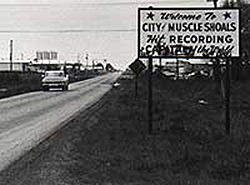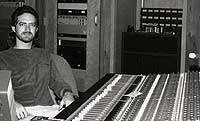
Heartland Platinum Rock
If Paul Simon seemed a bit intellectually aloof, Bob Seger connected on a gut level.
His association with the ‘Bama boys stretches back to 1972, and the Detroit rocker recorded many of his top hits in Muscle Shoals, including “Mainstreet,” “Old Time Rock & Roll,” “We’ve Got Tonight” and “Katmandu.”
“He’s a real nice guy but he’s not going to make it big,” was David Hood’s first impression. But he soon changed his mind.
“By the time of “Katmandu” he was getting the point across about what kind of records he wanted to make. Before that, we were throwing in R&B licks.”
“Everybody wasn’t thinking in the same direction.”
But that blistering, stuttering rocker turned things around. “I remember on that song we just kept going and going,” recalls Barry Beckett.
“I had blisters coming up on my fingers, and Roger had bleeding blisters on his. But we kept on going until we knew it was right. It was hard gut rock and roll.”
In later years, according to Hawkins, Seger’s surging success began to affect his behavior in the studio.
On occasion, during the session for Against the Wind, his easygoing demeanor would be frozen by moments of crisis.
“He would have trouble making up his mind,” says Hawkins. “He called it ‘platinum paranoia.’”
Turn Toward Production
In the late ‘70’s and into the early 1980’s, the rhythm section members became increasingly involved in production, most notably Beckett who by 1980 already had credits on projects by Dire Straits, Bob Dylan, Stephen Stills, John Prine and Delbert McClinton.
But since he often plays on the albums he is producing (or co-producing), Beckett confesses he often treads on the border of musical schizophrenia.
“It’s discipline,” he maintains, “that’s all it is. One way you turn the switch, you’re a musician, the other way, you’re a producer. But as a producer, you have to look back at yourself as a musician-but also as a producer, too.”
“So, it’s weird. When I’m producing, I try not to build around what I’m playing. I’ll build around something else, then add in what I can.”
When asked for his advice to aspiring studio keyboard players, Beckett took a long, thoughtful pull on a cigarette before answering.
“When I first came up here, I threw in every lick I could think of. I was going against rule number one, which is you only play what you need to support the artist. (Note: For an example, listen to the astonishing interplay between Beckett’s piano and Dylan’s voice on Slow Train Coming.)
So I was going against the artist, playing right on top-which is all wrong. It’s not time to show off unless the producer pushes the button and says, “Okay, now show off.” You have to feel the intensity level of the artist, and support that, and also anticipate when the artist is going to change.”
Working together for so long, says Beckett, has helped the Muscle Shoals section achieve an intuitive “feel” for each artist. “Working as a section, we have the time to learn how the other guys think. But we have to watch out.”

